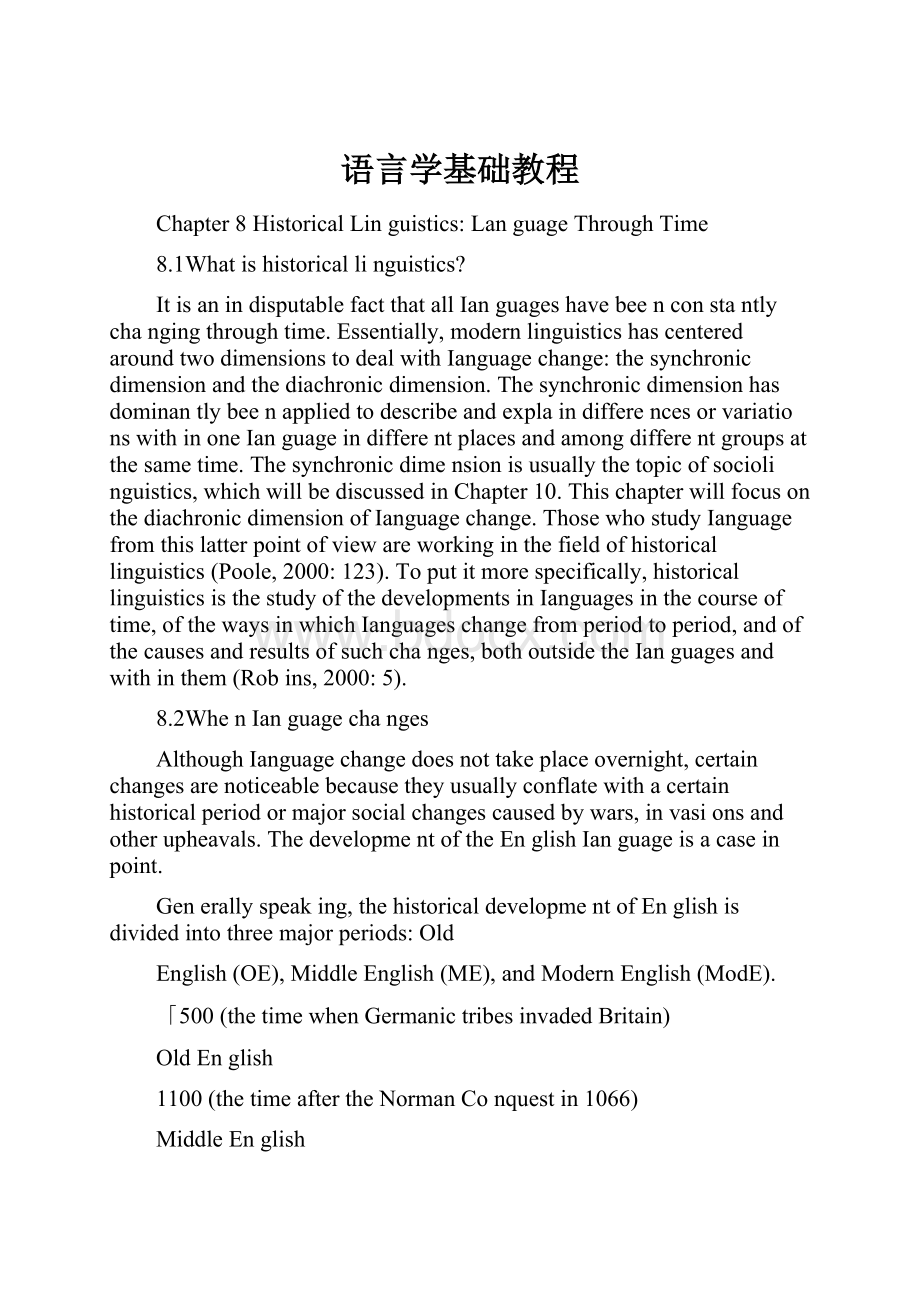语言学基础教程.docx
《语言学基础教程.docx》由会员分享,可在线阅读,更多相关《语言学基础教程.docx(12页珍藏版)》请在冰豆网上搜索。

语言学基础教程
Chapter8HistoricalLinguistics:
LanguageThroughTime
8.1Whatishistoricallinguistics?
ItisanindisputablefactthatallIanguageshavebeenconstantlychangingthroughtime.Essentially,modernlinguisticshascenteredaroundtwodimensionstodealwithIanguagechange:
thesynchronicdimensionandthediachronicdimension.ThesynchronicdimensionhasdominantlybeenappliedtodescribeandexplaindifferencesorvariationswithinoneIanguageindifferentplacesandamongdifferentgroupsatthesametime.Thesynchronicdimensionisusuallythetopicofsociolinguistics,whichwillbediscussedinChapter10.ThischapterwillfocusonthediachronicdimensionofIanguagechange.ThosewhostudyIanguagefromthislatterpointofviewareworkinginthefieldofhistoricallinguistics(Poole,2000:
123).Toputitmorespecifically,historicallinguisticsisthestudyofthedevelopmentsinIanguagesinthecourseoftime,ofthewaysinwhichIanguageschangefromperiodtoperiod,andofthecausesandresultsofsuchchanges,bothoutsidetheIanguagesandwithinthem(Robins,2000:
5).
8.2WhenIanguagechanges
AlthoughIanguagechangedoesnottakeplaceovernight,certainchangesarenoticeablebecausetheyusuallyconflatewithacertainhistoricalperiodormajorsocialchangescausedbywars,invasionsandotherupheavals.ThedevelopmentoftheEnglishIanguageisacaseinpoint.
Generallyspeaking,thehistoricaldevelopmentofEnglishisdividedintothreemajorperiods:
Old
English(OE),MiddleEnglish(ME),andModernEnglish(ModE).
「500(thetimewhenGermanictribesinvadedBritain)
OldEnglish
1100(thetimeaftertheNormanConquestin1066)
MiddleEnglish
1500(thebeginningofRenaissanceandthefirstprintingpresssetupin1476inEngland)
ModernEnglish
thepresent
Inabouttheyear449AD,theGermanictribesofAngles,SaxonsandJutesfromnorthern
EuropeinvadedBritainandbecamethefoundersoftheEnglishnation.TheirIanguage,withthe
GermanicIanguageasthesource,iscalled,thenamederivedfromthefirsttribe,theAngles.It
hadavocabularyinheritedalmostentirelyfromGermanicorformedbycompoundingorderivationfromGermanicelements(Dension,1993:
9).FromthisearlyvarietyofEnglisc,manyofthemostbasictermsintheEnglishIanguagecameintobeing:
mann(man”,cild(“hild”,
mete(food”,etan(eat”,drincan(drink”andfeohtan(fight”.FromthesixthtotheeighthcenturiesAD,theAnglo-SaxonswereconvertedtoChristianity,andanumberofterms,mainlytodowithreligion,philosophyandmedicine,wereborrowedintoEnglishfromLatin,theIanguage
ofreligion.Theoriginsofthemodernwordsangel,bishop,candle,church,martyr,priestandschoolalldatefromthatperiod.Fromtheeighthcenturytothetenthcentury,theVikingsfromnorthernEuropeinvadedEnglandandbroughtwordssuchasgive,law,leg,skin,sky,takeand
theyfromtheirIanguage,OldNorse(Yule,2000:
218).
Intheyearof1066AD,theNormanFrenchconqueredthewholeofEngland,bringingFrenchspeakersintotherulingclassandthenpushingFrenchtothepositionastheprestigeIanguage"forthenexttwohundredyears.ThisIanguagewasusedbythenobility,thegovernment,thelawandcivilizedbehavior,providingthesourceofsuchmoderntermsasarmy,court,defenseprisonandtax(Yule,2000:
219).YettheIanguageofthepeasantsremainedEnglish.
BytheendoftheMEperiod,whenEnglishhadonceagainbecomethefirstIanguageofallclasses,thebulkofOElexishadbecomeobsolete,andsometenthousandFrenchwordshadbeenincorporatedintoEnglish,maybe75%survivingintoModE(Baugh&Cable,2001:
174).
DuringtheearlyModEperiod,whichcoincidedwiththeRenaissaneeperiod,EnglishborrowedenormouslexicalresourcesfromtheclassicallanguagesofLatinandGreek.And,lateronastheBritishEmpireexpanded,therangeoflexicalinfluencewidenedtoevermoreexoticsourceIanguages(Dension,1993:
13).
ThetypesofborrowedwordsnotedaboveareexamplesofexternalchangesinEnglish,andtheinternalchangesoverlapwiththehistoricalperiodsdescribedabove.AccordingtoFennell(2005:
2),theyear500ADmarksthebranchingoffofEnglishfromotherGermanicdialects;theyear1100ADmarkstheperiodinwhichEnglishlostthevastmajorityofitsinflections,signalingthechangefromaIanguagethatrelieduponmorphologicalmarkingofgrammaticalrolestoonethatreliedonwordordertomaintainbasicgrammaticalrelations;andtheyear1500ADmarkstheendofmajorFrenchinfluenceontheIanguageandthetimewhentheuseofEnglishwasestablishedinallcommunicativecontexts.Thus,thoseinternalchangeswillbeelaboratedbelow
atthephonological,lexical,semanticandgrammaticallevels.
8.3HowIanguagechanges
ThechangeoftheEnglishIanguagewiththepassageoftimeissodramaticthattodaypeoplehardlyreadOEorMEwithoutspecialstudy.Ingeneral,thedifferencesamongOE,MEandModEinvolvesound,lexiconandgrammar,asdiscussedbelow.
8.3.1Phonologicalchange
TheprinciplethatsoundchangeisnormallyregularisaveryfruitfulbasisforexaminingthephonologicalhistoryofaIanguage.Themajorityofsoundchangescanbeunderstoodintermsofthemovementsofthevocalorgansduringspeech,andsometimesmoreparticularlyintermsofatendencytoreducearticulatoryeffort(Trask,2000:
70,96).
8.3.1.1Phonemicchange
8.3.1.1.1Vowelchange
OneofthemostobviousdifferencesbetweenModEandtheEnglishspokeninearlierperiods
isinthequalityofthevowelsounds(Yule,2000:
219).SometimesaIanguageexperiencesawholesaleshiftinalargepartofitsphonologicalsystem.ThishappenedtothelongvowelsofEnglishinthefifteenthandsixteenthcenturiesAD,eachvowelbecomingcloser,thehighestbecomingdiphthongsasinthewordswifeandhouse(respectivelychangedfromwayf/wi:
f/andhaws/hu:
s/inOE).WecallthisshifttheGreatVowelShift(Poole,2000:
127),andthespecificchangesmaybediagrammedasfollows(Robins,2000:
342).
InME,thevowelsinnearlyallunstressedsyllabicinflectionswerereducedto[?
],spelled
(Dension,1993:
12).Thegeneralobscuringofunstressedsyllablesisamostsignificantsound
change(tobeelaboratedfurtherin8.3.3and8.3.4),sinceitisoneofthefundamentalcausesofthelossofinflections(Fennell,2005:
99).
8.3.1.1.2Consonantchange
Consonantsareproducedwithanobstructionoftheair-stream,andtendtobelessstableovertimethanvowelsinmostIanguages.Twofairlycommonprocessesareassimilationandlenition.
Assimilationistheprocessbywhichtwosoundsthatoccurclosetogetherinspeechbecomemorealike.Thissortofchangeiseasytounderstand:
movingthespeechorgansallovertheplacerequiresaneffort,andmakingnearbysoundsmoresimilarreducestheamountofmovementrequired,andhencetheamountofeffort(Trask,2000:
53).Instancescanbefoundinwordssuchasirregular,impossibleandillegal,inwhichthenegativeprefixesim-andil-shouldbe“h-based”inaccordaneewithetymology
Undertheinflueneeofneighboringvowels,consonantsmayalsobeweakened.Thisweakeningorlenition,canchangeavoicelessconsonantintoavoicedoneandaplosiveintoafricative(Poole,2000:
126).Instancesof[h]innativeEnglishwordsgenerallyderivefromthelenitionofanearlier*[k]:
suchwordsashead,heart,help,hillandheallbeganwith[k]inaremoteancestralformofEnglish,butthis[k]waslenitedfirstto[x]andthento[h],andthemodernlenitionof[h]tozeromerelycompletesaprocessoflenitionstretchingoverseveralthousandyears(Trask,2000:
59).
8.3.1.2Whole-segmentchange
Certainphonologicalchangesaresomewhatunusualinthattheyinvolve,notjustchangesinthenatureofsegments,butachangeinthenumberororderingofsegments,andthesearereferredtoaswhole-segmentprocesses(Trask,2000:
66).Thechangeknownasmetathesisinvolvesareversalinpositionoftwoadjoiningsounds.ThefollowingareexamplesfromtheOEperiod:
acsianaskbriddbirdbrinnanbeornan(burn)
fristfirsthroshorsewaepswasp
(Yule,2000:
220).
8.3.2Lexicalchange
AsdefinedbyFreeborn(2000:
23),lexicalchangereferstonewwordsbeingneededinthevocabularytorefertonewthingsorconcepts,withotherwordsdroppingoutwhentheynoIongerhaveanyuseinsociety.Lexicalchangemayalsoinvolvesemanticchange,thatis,changeinthemeaningofwords.Thus,lexicalchangemainlyconsistsofadditionofnewwords,lossofwordsandchangeinthemeaningofwords.
8.3.2.1Additionofnewwords
Theconditionsoflifeforindividualsinsociety,theirartifacts,customs,andformsoforganizationareconstantlychanging.Accordingly,manywordsinIanguagesandthesituationsinwhichtheyareemployedareequallyliabletochangeinthecourseoftime(Robins,2000:
343).Floodsofnewwordsconstantlyneedtobeaddedtotheword-stocktoreflectthesedevelopments.Etymology,whichisthestudyofthehistoryofindividualwords,showsthatwhilethemajorityofwordsinaIanguagearenativewords,theremayalsobeloanwordsorborrowedwordsfromanotherIanguage.NativewordsarethosethatcanbetracedbacktotheearliestformoftheIanguageinquestion.InEnglish,nativewordsarewordsofAnglo-Saxonorigin,suchasfull,hand,wind,red.LoanwordsarethosethatareborrowedorimportedfromanotherIanguage,suchasmyth,career,formula,genius.Apartfrom